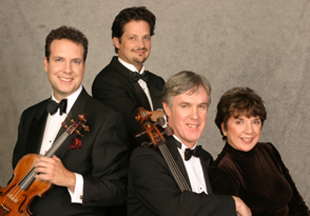As festival shifts gears, Bergonzi Quartet does justice to Mozart and Sibelius

The Bergonzi String Quartet performed Sunday at the Mainly Mozart Festival.
Change is in the air for the Mainly Mozart Festival. The annual May-June concert series was founded two decades ago by journalist and arts patron George Volsky and University of Miami music professor Frank Cooper. For the past three years, the festival has been produced by the Miami Music Project under the artistic guidance of former Florida Philharmonic conductor James Judd.
Beginning in 2014, a new group, Chamber Music Society of Miami, will take over the festival’s direction. With Coral Gables attorney Mike Eidson as president and pianist Marina Radiushina as artistic director, the recently formed organization plans to expand Mainly Mozart’s geographic venues and artistic scope. Next Sunday’s final festival concert, programmed by Radiushina, will serve as a preview of the future, with the diverse program featuring dance as well as twentieth century chamber scores.
Sunday afternoon’s program at the Coral Gables Museum, in many ways, marked the end of an era. The Bergonzi String Quartet has been a mainstay of the festival from its very first outing. Joined by clarinetist Margaret Donaghue Flavin, the quartet paid tribute to the series’ namesake with a warmly sonorous, mellow performance of the Clarinet Quintet in A Major.
The Bergonzi foursome (violinists Glenn Basham and Scott Flavin, violist Pamela McConnell and cellist Ross Harbaugh) managed to tame the overly bright acoustic of the museum’s meeting room more skillfully than the other groups that have played there. Felicitously blended and well balanced, their corporate sound exuded richness and depth, the instrumental strands clear and well articulated.
Donaghue Flavin’s agility in the wide leaps between registers and supple phrasing anchored a beautifully proportioned reading with the Larghetto floated like an instrumental operatic aria. At a more stately tempo in the Menuetto than usual, the quirky turns of the trio were even more surprising. The florid variations of the finale were projected with rhythmic bite and aristocratic nobility, the zippy coda an ingratiating conclusion to a delightful reading.
Two scores by Finnish master Jean Sibelius formed the program’s second half. Flavin’s arrangement of the Nocturne from the incidental music for Belshazzar’s Feast substituted a violin for the original solo part for flute. Basham’s honeyed vibrato and lyricism proved a fine match for the score’s pensive melody.
Written in 1908, the String Quartet in D minor (Intimate Voices) was Sibelius’ last major chamber work. The score’s misty, churning opening fragments are vintage Sibelius, similar to the orchestral writing in his symphonies. Indeed Sibelius manages to imbue the four string instruments with much of his colorful orchestral palette, the climax of the first movement an outburst of symphonic proportions. The Vivace shimmered in glistening rays of light amidst snow capped mountains and the Andante abounded in drama and impassioned melody worthy of Tchaikovsky.
The Allegro finale recalls the rustic vigor of Grieg’s Norwegian Dances. The Bergonzi’s intensely dramatic, finely proportioned traversal scaled the emotional heights and depths of this unjustly neglected score, with Harbaugh’s deep-toned cello solo in the slow movement particularly distinguished.
The Mainly Mozart Festival concludes 3 p.m. June 16 at the University of Miami Gusman Concert Hall with pianist Marina Radiushina, violinist Eli Matthews and cellist Joshua Roman playing works by Mozart, Schnittke, Part, Janacek, Falla and Piazzolla and members of Miami City Ballet in the premiere of choreography by Adriana Pierce to music by Schoenfield. 786-469-2251; mainlymozart.com.
Posted in Performances
Leave a Comment
Mon Jun 10, 2013
at 12:12 pm
No Comments